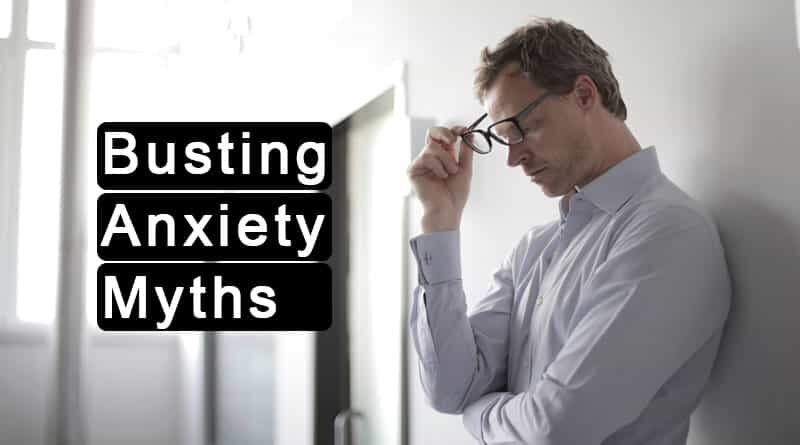Busting Anxiety Myths and When It’s Time for Anxiety Relief
There are several types of mental illnesses but anxiety is something that is not taken seriously or even considered a mental illness. The truth is that anxiety is a common mental illness that inflicts millions of people worldwide. Most people suffering from anxiety disorder fail to report their troubles and continue to suffer in silence.
Unfortunately, anxiety is mostly suspected to be an emotional response to a particular environment without having any lasting impact. But the matter of the fact is that anxiety(1) is much more serious and lasting that many of us think it to be true.
A conversation about anxiety is limited and highly skewed because we tend to believe in things that aren’t factual. In other words, we believe in myths. But it is time we bust a few of these myths. We must separate facts from the fiction so that anxiety disorder is not rubbished and we educate ourselves better.
Table of Contents
Anxiety Myths
#Myth 1 – Anxiety Isn’t An Illness
The truth is that anxiety is real. It can be diagnosed as a psychiatric condition. Anxiety is often confused to be a mere emotional response especially at times when we are feeling stressed, anxious or worried.
While it is true that when these emotional outbursts happen in small bouts, there is nothing to worry. But if you are persistently worrying about one’s finances, career, family and health etc. it is a serious problem.
The common indicative symptoms of anxiety disorder are regularly feeling a tightness in the chest, difficultly in concentrating, racing heart, difficulty in sleeping, digestive problems, a sense of impending doom etc.
Read: Self Care During Quarantine
#Myth 2 – Anxiety isn’t Chronic
Most people tend to believe that anxiety is a passing emotion, it isn’t chronic. But when it’s a mental disorder, it lingers for months. It is persistent. While it is true that we all feel anxious from time to time, it must also be understood that anxiety disorder doesn’t get cured all on its own. You have to seek relief from anxiety and depression through psychotherapy, lifestyle and behavioural changes and necessary medications.
#Myth 3 – Avoiding Stressful Situations is Effective
Stressful situations can aggravate anxiety but one cannot avoid stress to stay away from anxiety. Most people suffering from anxiety get panic attacks even in the midst of a perfectly normal day, among loved ones and with no visible triggers. Simply avoiding stressful situations isn’t an effective or good enough solution. However, it is important that people identify triggers, most common of which are –
- Social situations,
- Phobias such as public speaking, height, enclosed spaces,
- Professional conflict,
- Health worries.
Read: Tips for Depression
#Myth 4 – Anxiety Disorder is a Hype
Many people dismiss anxiety disorder to not be a real problem. Instead, they term it as hype created by the media. The truth is far removed from this. At least 33.7% of adults in the USA have suffered from anxiety disorder sometime in their lives.
There are many types of anxiety disorder affecting people. Generalized anxiety disorder or GAD is the most common type afflicting more women than men. This is followed by PTSD or post-traumatic stress disorder(2), social anxiety, obsessive-compulsive disorder and phobias.
#Myth 5 – Person Suffering From Anxiety Disorder Can Easily be Identified
We expect people suffering from anxiety disorder to always be sad. It is often believed that they prefer to remain secluded, that they avoid people and stay away from stressful situations. The truth is it isn’t easy to identify a person suffering from an anxiety disorder.
Most people suffer in silence, they do not share their inner demons. Societal pressure and embarrassment are the two main causes of why people suffering from anxiety disorder do not talk about their problems.
#Myth 6 – Anxiety Can Only Be Clinically Treated
It is a common misconception that anxiety disorder, when really alarming, can only be treated through medical intervention. While medical supervision cannot be ruled out, there are several other ways to seek relief. Alternatives such as psychotherapy, cognitive behavioural therapy are effective. Below we shall be talking about various relaxation techniques that help relieve anxiety.
Read: Healthy Eating and Exercise
How to Seek Anxiety Relief?
Busting myths surrounding anxiety disorder is the need of the hour. What’s equally important is the need to spread awareness about anxiety relief. The good news is that you can get anxiety relief at home without medical supervision. So how to get anxiety relief? Here are a few tips that you can try at home.
- Start Taking Herbal Pills: You will find several varieties readily available in the market as over the counter medications. Herbal pills have minimal side effects, do not cause drowsiness and can help calm anxiety-causing nerves. When to seek anxiety relief pills? If you are feeling stressed and panicking every often, you should start taking these pills.
- Exercise: It is very important to have a healthy body in order to have a healthy mind. Start waking up an hour earlier every day so that you can dedicate the time to yourself. You must learn to jog, run, practice yoga so that you remain agile.
- Deep Breathing and Meditation: In order to keep anxiety and stress at bay it is important that you practice meditation and deep breathing. Meditation helps to re-focus on important things, helps to keep the mind calm and helps to see things in perspective.
- Talk to Someone: You do not need to battle anxiety alone. Talk to someone who is close to you. Share your fears and stress. Talking about your problems oftentimes solves half the problem. Do not keep things bottled up inside you. This will only aggravate the problem and lead to serious complications.
- Take Up A Hobby: Anxiety and stress often hit a person when he is idle. Do not stay idle. In order to avoid procrastination, it is beneficial if you take up a new hobby. It could be anything under the sun – gardening, reading, cooking, sewing, singing, playing a musical instrument etc. Developing a new skill helps a person battle anxiety.
So, if you are wondering what can relieve anxiety, you now know that help is right in front of you. In case the above-mentioned tips do not help relieve your anxiety, seek help from a professional. They will be able to steer you towards a life free of anxiety, panic and stress.
Recommended Articles:
Meditation Mistakes That Can Increase Anxiety




